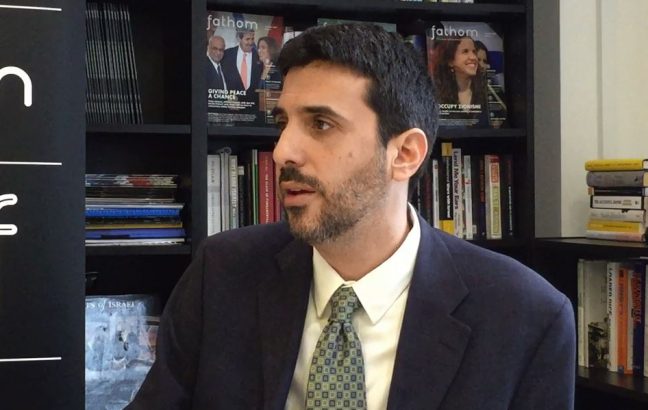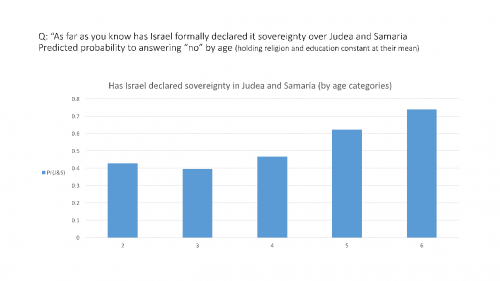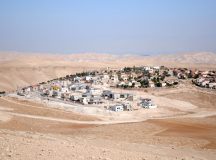Oded Haklai reports on research suggesting that for the generations of Israeli Jews born after 1967, the pre-1967 boundaries of Israel are becoming less and less real. As time has passed since 1967, Israeli Jews have increasingly come to believe that the territories are an integral part of Israel. Noting the importance of time for conflict entrenchment he warns that ‘the longer Israel holds on to the contested territories, the older grows the generation that remembers Israel in its pre-1967 borders gets, and the larger the number of Israeli Jews who accept the control of Judea and Samaria as the natural state of affairs.’
The Research Problem
This research project emanates from the book Settlers in Contested Lands: Territorial Disputes and Ethnic Conflicts. In that text my co-editor, Neophytos Loizides, and I compared the Israeli case to a number of other cases where there are territorial disputes that feature settlers as one of their prominent aspects; for example, Turkish settlers in Northern Cyprus, Moroccan settlers in West Sahara and Indonesian settlers in East Timor. We identified some common patterns and peculiarities and, as we finished the book, an Israeli peculiarity stood out to me that I wanted to investigate further: Israel never formally pronounced a change in the status of the territory.
In most other cases around the world, the state that sent its settlers to the disputed territory usually made a formal pronouncement about the changing status of the territory. When Turkey sent its settlers to Northern Cyprus it also created the Turkish Republic of Northern Cyprus (TRNC), while Morocco formally annexed Western Sahara. By contrast, the Israeli settlement project was never accompanied by a formal pronouncement on changing the territory’s status. It was a conscious Israeli decision in the late 1970s to leave the status of the disputed territories open. Menachem Begin was fully committed to the ideology of the Jews owning the whole Land of Israel, but he was also committed to making peace with Egypt. He realised that a formal annexation would jeopardise peace-making with Egypt, so he decided to leave the issue of sovereignty open.
Governments committed to Israeli control over the West Bank/Judea and Samaria have continued to encourage the settlement project while governments of the centre-Left have not managed to stop it. So the question becomes: if Israel was not going to annex, why have right-wing governments encouraged settlements in the occupied territories in the first place?
There are a number of reasons. Some believe that Jews should be entitled to live in their homeland irrespective of who the sovereign is. That’s the ideological drive. Some are motivated by security reasons and geo-strategic considerations. But it seems there was another reason: changing the mind-sets of Israeli Jews themselves with regard to the status of these territories. In short, as time has passed since 1967, Israeli Jews have increasingly come to believe that the territories are an integral part of Israel.
The Research
With 2017 marking the 50th anniversary of the 1967 Six-Day War, I conducted a public opinion survey amongst Israeli Jews regarding the status of Judea and Samaria and the settlements on these territories. I wanted to identify how Israeli Jews perceive these territories. The survey was conducted in October and November 2016, among a representative sample of 1,027 Israeli Jews. The question I asked was substantively very different from many other surveys that are being conducted. Most surveys ask respondents what they think ought to happen, i.e. if they believe Israel ought to annex the territories, if they support settlement construction, if they support the two-state solution, if they support the evacuation of settlements, and so on. My survey didn’t ask people what ought to happen. Instead, it asked them what they think already exists. It asked respondents whether to the best of their knowledge Israel has formally declared its sovereignty over Judea and Samaria. It asked respondents whether they believe certain settlements in the West Bank lie within the territory of the State of Israel.
Key Variables
When the conventional question – ‘what do you think should happen?’ – is asked, researchers find that religion is the primary predictor of peoples responses. Religion in Israel is highly correlated with political opinion; generally speaking respondents who belong to the national-religious community tend to hold positions more committed to the ideology of the Whole Land of Israel, whereas those who are more secular are more likely to support territorial compromise. But when the questions were rephrased, and people were asked what they believe actually exists, I found something different: the generational cohort to which they belong is a key variable.
Confusion about borders
In response to the question ‘To the best of your knowledge has Israel formally declared its sovereignty over Judea and Samaria’ only about half of the respondents answered ‘no’ (the correct answer), while the other half were split between ‘yes’ and ‘do not know’. In Israel, there are discussions today about formally extending civilian law (i.e. a form of annexation) to at least some parts of the West Bank, such as Maaleh Adumim. Yet only half of the respondents knew Israel had not already extended its sovereignty formally to these territories. (I should add these are the raw results of the survey with a margin of error of plus/minus 3.1 per cent.) The findings reveal a lot of confusion in the minds of Israelis regarding the status of these territories.
I chose eight settlements for this survey and ensured variation in the size of the settlements and their geographical location. Some lie deep in the West Bank/Judea and Samaria, others are more proximate to the Green Line. They are also different in terms of their socio-demographic characteristics; some are big, some are small, some are urban centres, some are religious communities. The one thing they all have in common is they are relatively old and established. There isn’t a single settlement I asked about that was established after 1980s, so all are 37 years or older. I did that because I didn’t want the age of the settlement to interfere with my findings – new settlements may be less familiar to people.
The findings show a lot of confusion among Israeli Jews. There were three settlements (Ariel, Kiryat Arba and Ma’ale Adumim) which the majority of respondents thought lay inside the territory of the State of Israel. There were two settlements, which a plurality of respondents thought were inside the State of Israel (Kfar Etzion and Shilo) and three settlements which a plurality of the respondents thought were outside the territory of the State of Israel (Beit El, Elon Moreh and Ma’ale Shomron). What is interesting is there was not a single settlement which a majority of respondents thought was outside the territory of the State of Israel.
‘The age of 50 is a breaking point of sorts’
The responses varied according to age categories. Those in the age category of 60+ were more likely to provide a correct answer than those in younger age categories. Note that the table shows not quite a linear progression because the gap between those in their 20s and those in their 40s is much smaller than the gap between those in their 40s and those in their 50s. In other words, the age of 50 is a breaking point of sorts; the majority of those 50 years or older are more likely to say that Israel has not formally declared its sovereignty over Judea and Samaria whereas the majority of those 49 and younger are likely respond otherwise.
Table 1. People responding that Israel has not formally declared sovereignty over Judea and Samaria by age groups
| 18-29 | 30-39 | 40-49 | 50-59 | 60 and over | |
| Has not declared sovereignty | 40% | 41% | 48.5% | 61% | 73% |
It is possible to isolate the variables of religion and education. In this chart (below) you can see that even when religion is held constant we still see the importance of age.
Table 2.
Again, we have a situation when those of the same religious inclination in their 20s, 30s and 40s are very close together in their responses whereas those in their 50s and 60s provide a very different answer – they are more likely to say that Israel has not formally pronounced its sovereignty over Judea and Samaria.
The same pattern – age as a key independent variable – appeared throughout the responses. So when we look at the question of Ariel, for example, amongst all the respondents the responses do not vary that much from those of the religious-Zionist with one exception which is the very youngest group, those between the ages 18-29.
Table 3. Respondents who answered that Ariel does not lie within the territory of the State of Israel
| Age | All respondents | Religious Zionists |
| 18-29 | 32% | 22% |
| 30-39 | 34% | 36% |
| 40-49 | 41% | 43% |
| 50-59 | 57% | 53% |
| 60 and Older | 64% | 60% |
Amongst all respondents in the 60+ age category, 64 per cent thought Ariel was outside the territory of the State of Israel, whereas for those of that age group among the religious-Zionist category, it was 60 percent. Amongst all respondents in the 50-59 age category, 57 per cent thought that Ariel was outside the State of Israel and of those of that age in the religious-Zionist category, 53 per cent. Amongst all respondents in the 30-39 age category, only 34 per cent thought Ariel was outside the territory of the State of Israel, whereas for those of that age in the Religious-Zionist category, it was 36 per cent.
Why is it that 50 years of age is where the generational divide occurs? In short, the Six-Day War. The year 2017 marks the 50th anniversary of the 1967 War in which Israel conquered the contested territory from Jordan. Those born before 1967 are more likely to remember Israel’s pre-1967 boundaries. They know that Israel has not formally declared its sovereignty over Judea and Samaria. They view the settlements to be outside the territory of the State of Israel, and this is especially true of those who were at least 10 years or older in 1967; for that generation the ‘Green Line’ is more tangible. They lived in Israel’s pre-1967 borders.
In contrast, for those born after 1967, the pre-1967 war boundaries are just not palpable. The specific range of experiences that individuals in the lower age groups have undergone means they have a state of mind for which the ‘Green Line’ of the pre-1967 War doesn’t feature. For example, they regularly see Ariel on weather forecasts. They open the sports pages of newspapers to see the football results and they see teams from Ma’ale Adumim and Ariel. They go on go trips to the Dead Sea and they see signs for Ma’ale Adumim. If you drive on one of the major Israeli highways in central Israel you come to an intersection, turn left and you go to Herzilya and Tel Aviv, if you continue straight ahead its Ra’anana, and turn right – Ariel.
So the everyday experience of the Israeli Jews born after 1967 doesn’t provide the conditions for them to conceive of the settlements to be outside the State of Israel. There is no reason for them to think that they are outside of Israel. The reason why Ma’ale Adumim, Kiryat Arba, and Ariel are so likely to be thought part of Israel is because they are more likely to be experienced in the ways I have just mentioned. Kiryat Arba and Ariel have centres for the performing arts. So, if you like shows and you open the Israel version of Time Out you are likely to see – even if you have never visited the settlements – a musician you like or a particular theatre show playing in Ariel or Kiryat Arba. This resonates in the minds of the younger generation. Exposed to these names in their daily lives, even if just in passing, they are more likely to conceive of them as being part of Israel.
One of the things this research tries to alert us to is the importance of time for conflict entrenchment. As time goes by, an existing reality gets routinised and eventually entrenched in the perceptions of new generations that did not experience previous states of affairs. I sometimes like to express the similarities with the vote on Brexit. Those born to a EU reality are finding it very difficult to conceive of a Britain outside of the EU. In the referendum there was a generational gap in the voting patterns. In Israel something similar is happening. The longer Israel holds on to the contested territories, the older grows the generation that remembers Israel in its pre-1967 borders gets, and the larger the number of Israeli Jews who accept the control of Judea and Samaria as the natural state of affairs.
As regards settlement policy, I have never found evidence for a grand design. I have never found evidence of the government sitting around the table saying ‘we are going to do to try and change the minds of the Israelis.’ But there is certainly enough evidence to show from statements by politicians and activists sympathetic to the settlement enterprise that trying to change the way Israelis think about the settlement enterprise is an objective – and this is something that supporters of the two-state solution should be aware of.






































Under the League of Nations’ Mandate, as re-adopted by the UN Charter, all of the West Bank is part of the Jewish State. Hence, when Israel took control over it in a defensive war in 1967, it automatically assumed legal sovereignty without the necessity of a formal declaration. It has declined to issue that declaration for the reason that it intends to divest itself of some to that territory in the interests of peace and because of its reluctance to dominate a hostile population residing in parts of that territory, primarily in Areas A and B. More and more Israelis consider the Jewish-inhabited areas of the West Bank as part of Israel as they should, because they are — legally, historically and practically.
Herbert Grossman
You seem to have made an erroneous assumption regarding the West Bank pertaining to Israel.
The British Mandate for Palestine was, like all other Mandates; set up to prepare the indigenous populations for self-determination, leading to independence. Articl 22 of the Covenant of the league clearly stated that “The wishes of these communities must be a principal consideration in the selection of the Mandatory”. These “communities” refers to the indigenous inhabitants such as Jews, Muslims, Christians and others. The majority indigenous peoples throughout the mandate period were always the Palestinian Muslims followed by a minority, Palestinian Jews. To insinuate, therefore, that Jews from all over the world could immigrate there and be granted self-government is erroneous. In 1948 the majority of the Jewish population were not those who lived in the land since 1923 when the Mandate was enforced.
The influx of Jews to the territory violated Article 22 and consequently does not have legal standing as you insinuate in your closing words. As a consequence your other points have no legal basis and can be considered invalid.
Of course, for those, as myself, who are 50+, there is another aspect – the memory of a vulnerable Israel, its difficult security situation, 100s and dead and 1000s of wounded due to Arab terror before any “occupation” and any “settlement construction”, the psychological effects, etc. on the civilian population – all work as elements to assure the retention of the territories whether under Israel’s full eventual sovereignty, an autonomy plan, confederation with Jordan or any other solution because without then, the safety and security and soul of Israel will be threatened and in danger.